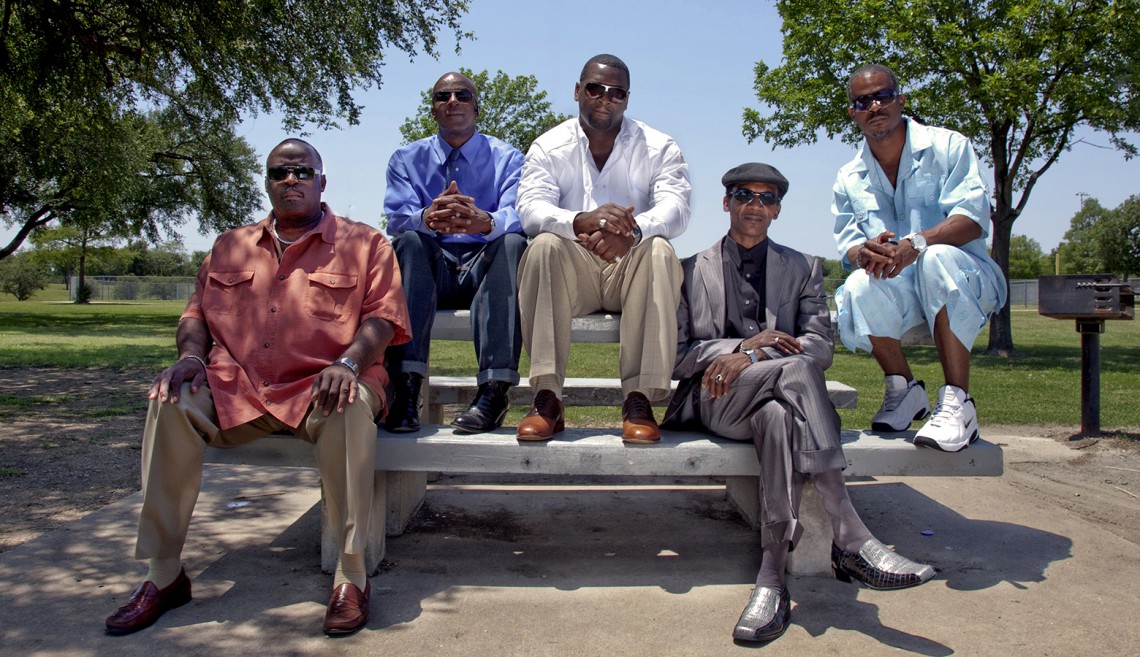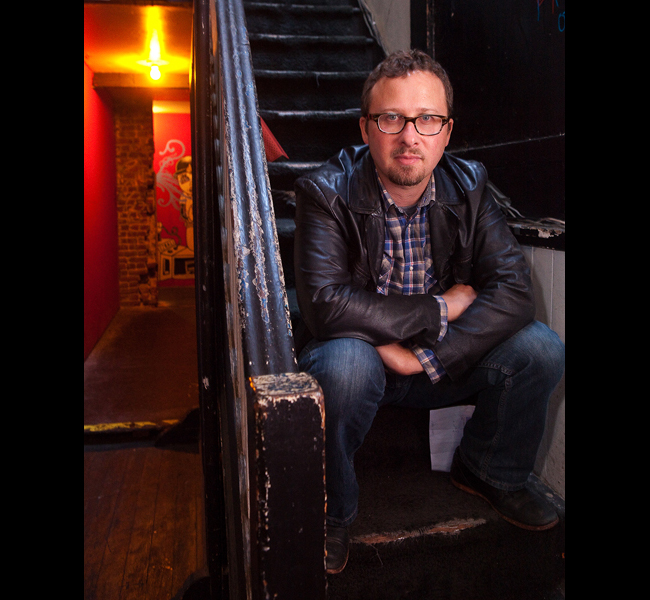
The Freedom Fighters.
Sarah LimStanford filmmaker aims to reveal injustices of wrongful convictions
In his latest documentary film, award-winning documentarian and Stanford professor Jamie Meltzer documents the work of a detective agency run by exonerated men who work to fight wrongful convictions and the criminal justice system.
When Jamie Meltzer touches down in Dallas to film scenes for his upcoming documentary Freedom Fighters, he never quite knows what to expect. On one visit, he interviewed exoneree Johnnie Lindsey in his backyard at the break of dawn.
“The sun was coming up and he just sat there listening to birds and trains and all the morning sounds while having his morning coffee. This is a daily ritual for him,” said Meltzer, an assistant professor of art and art history at Stanford.
Lindsey spent 26 years in prison, wrongfully convicted of rape. “He does this every morning to appreciate the smaller things in life,” Meltzer said.

Saul Bromberger and Sandra Hoover
Lindsey is one of the investigators in Freedom Fighters, the group at the heart of Meltzer’s current film. The members, all from the Dallas area and all wrongfully convicted of a crime, each spent at least a decade in prison before being exonerated. The men now work together to free other innocent people who are behind bars. In addition to investigating individual cases, they are working toward the larger objective of preventing further miscarriages of justice.
Meltzer is about halfway through filming Freedom Fighters; he described the process as challenging because he and his team are documenting the group as they set up their investigation agency and take on their first cases.
Meltzer said the unpredictable nature of the subject matter makes for exciting filmmaking: “You are not in control of what is happening or how the story will unfold or what obstacles they will come up against within the criminal justice system.”
The human element, however, is what drives the story that Meltzer wants to tell. “Beyond anything about the criminal justice system,” Meltzer said, “the film looks at the exonerees, their support for one another, their struggles and their passion.”
“I hope that the spirit they have is kind of an inspiration to everyone who sees the film,” he added.
Filmmaker Jamie Meltzer decided to document the Freedom Fighters after he heard about the men from a reporter friend and was moved by their story.
Meltzer made his first film, Pegasus, in 1998 and his subsequent films have won awards and been screened at numerous film festivals. His most recent film, Informant, won the Best Documentary Jury Award at the Austin Film Festival as well as the Grand Jury Prize at Doc NYC.
In that film, Meltzer raises more questions than answers about a radical activist turned FBI informant. That thought-provoking approach represents a key feature of documentaries, Meltzer said, because ultimately, “the role of documentaries is not about telling us what to think.”
Meltzer added that he does not make “the kind of documentaries that lay claim to absolute truth.” Rather, he said he aims to present differing perspectives, allowing the viewer to “question critically the subject matter, the film itself and documentaries in general.” Further, Meltzer said he feels that the “most honest documentaries tell you that they are not clear representations of truth.”
Meltzer decided to make Freedom Fighters after a reporter friend told him about the men and their agency, which led him to attend a meeting of exonerees. “I remember being at this meeting and just being so moved amongst those people who have all been through such a life-changing experience. It was a really powerful feeling,” Meltzer said.
The fact that men at the meeting had just started a detective agency “was really just the icing on the cake,” said Meltzer, because “it meant that the film could chronicle a wrongful conviction from a really unique perspective.”
Lives derailed
The fallibility of the criminal justice system is a central issue in the film, but it is the manner in which wrongful convictions occur that drew Meltzer to the project.
Meltzer focuses on a few specific cases from a variety of vantage points. Perspectives, such as those of the person in prison, eyewitnesses, prosecutors and the investigating officers are vital. “These perspectives,” Meltzer said, “often clash, and in some cases conspired to put someone behind bars who should not be there.”
These men have formed an investigation agency in Dallas called the Freedom Fighters. All wrongfully convicted of a crime, each spent at least a decade in prison before being exonerated. They now work toward preventing further miscarriages of justice.
Erroneous witness testimony, Meltzer said, is often the main cause of wrongful convictions: “There are victims who mistakenly identify someone, not generally through any malice, but just through problems with the way that memory is fallible.
“Our memories are unreliable; we are influenced by a suggestion or influenced by the investigating officers. There is often prosecutorial and police misconduct, and in a lot of these cases the eyewitness identification was really the only thing that the prosecutors had.”
Wrongful conviction is one of the most urgent issues facing our criminal justice system, and it tends to victimize black males under 30, Meltzer said. Since 2000, there have been an average of only 52 exonerations a year.
“Wrongful convictions derail lives, steal years away from families, and they leave dangerous criminals at large. The Freedom Fighters represent a way forward, working on specific cases and lobbying in the state capitol. They are an inspiration, bringing positive, grassroots change to the system that wronged them,” Meltzer said.
From the field to the classroom
Meltzer, who works in the Film and Media Studies program and teaches filmmaking in the MFA program in documentary film and video production, sees teaching and artistic creativity as being closely intertwined.
For Meltzer, the practical experience from working on documentary films translates easily into the classroom: “I constantly bring my process into the classroom. I usually show a scene from a film I have made and discuss the context of those creative choices, or show, in a funding proposal, how my thinking about the film was conveyed in writing.”
Meltzer works with a small team on his projects and often involves former students. His former student Peter Jordan, now an established filmmaker, did a lot of the early work on Freedom Fighters. David Alvarado, another of Meltzer’s former students, continues to help produce and shoot the film.
Freedom Fighters is contracted to air on PBS after an extensive film festival circuit. However, there is still another year of production and some six months of editing to be done, so the film will not be released until 2015.
“Making this film has been a real lesson in appreciating the smaller things in life. But the most important thing is for people to learn how wrongful convictions happen. People are not as aware of that issue as they should be,” Meltzer said.
